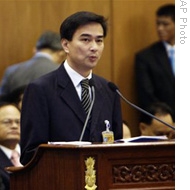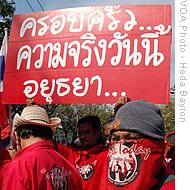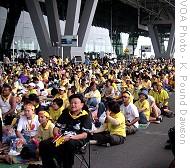-
(单词翻译:双击或拖选)
 |
| Prime Minister Abhisit Vejjajiva delivers government policy speech at Foreign Ministry in Bangkok, 30 Dec 2008 |
Prime Minister Abhisit Vejjajiva begins his policy speech Tuesday, before going on to say the government will provide additional funds to villages to develop their infrastructure4. The new administration plans to spend over $8 billion to stimulate5 the economy.
The economy, dependent on exports and tourism, is expected to contract because of the global slowdown and domestic political infighting.
Mr. Abhisit's speech, postponed6 from Monday, was relocated at the last moment to the Foreign Ministry after anti-government protesters refused to end their siege of parliament.
 |
| Supporters of ousted7 Thai Prime Minister Thaksin Shinawatra protest in Bangkok |
The protesters, who support former Prime Minister Thaksin Shinawatra, consider Mr. Abhisit's two-week-old government illegal. They demand fresh general elections. The pro-Thaksin opposition8 party boycotted9 the prime minister's speech Tuesday.
Sirichok Sopha, a member of parliament from Mr. Abhisit's Democrat10 Party, says the government's main goal is to ease political tensions and revive the economy.
"It's about unity, that's the most important thing, to get the people of Thailand to unite and to understand that Khun [Mr.] Abhisit is the prime minister of every Thai whether it's anti-government or pro-government," said Sirichok. "We will try to deliver our economic stimulus11 package, telling Thai people what we'll do through this economic crisis."
Mr. Abhisit's coalition12 came to power after several allies of a pro-Thaksin party split to join with the Democrats13.
Chris Baker14, a historian and writer about Thai politics, says while the new government will continue to face pressure from Mr. Thaksin's supporters, it is likely to survive into the immediate15 future.
"Certainly if it can get through this current hurdle16 and the next few weeks, it will probably survive and hang on to grim death, but it could be there for some time," he said.
 |
| Protesters at main international airport in Bangkok, 26 Nov 2008 |
The country is sharply divided between groups that favor or oppose Mr. Thaksin and his allies. For nearly six months, anti-Thaksin groups held daily protests, ending with an eight-day blockade of Bangkok's airports a few weeks ago. The blockade stranded17 up to 300,000 tourists and hurt exports, causing hundreds of millions of dollars in economic damage.
Mr. Thaksin, ousted in a coup18 two years ago, remains19 popular with the rural poor and urban working class. But the urban middle class and educated accuse him of corruption20. He fled Thailand to avoid corruption charges.
 收听单词发音
收听单词发音
1
unity

|
|
| n.团结,联合,统一;和睦,协调 | |
参考例句: |
|
|
|
2
convene

|
|
| v.集合,召集,召唤,聚集,集合 | |
参考例句: |
|
|
|
3
ministry

|
|
| n.(政府的)部;牧师 | |
参考例句: |
|
|
|
4
infrastructure

|
|
| n.下部构造,下部组织,基础结构,基础设施 | |
参考例句: |
|
|
|
5
stimulate

|
|
| vt.刺激,使兴奋;激励,使…振奋 | |
参考例句: |
|
|
|
6
postponed

|
|
| vt.& vi.延期,缓办,(使)延迟vt.把…放在次要地位;[语]把…放在后面(或句尾)vi.(疟疾等)延缓发作(或复发) | |
参考例句: |
|
|
|
7
ousted

|
|
| 驱逐( oust的过去式和过去分词 ); 革职; 罢黜; 剥夺 | |
参考例句: |
|
|
|
8
opposition

|
|
| n.反对,敌对 | |
参考例句: |
|
|
|
9
boycotted

|
|
| 抵制,拒绝参加( boycott的过去式和过去分词 ) | |
参考例句: |
|
|
|
10
democrat

|
|
| n.民主主义者,民主人士;民主党党员 | |
参考例句: |
|
|
|
11
stimulus

|
|
| n.刺激,刺激物,促进因素,引起兴奋的事物 | |
参考例句: |
|
|
|
12
coalition

|
|
| n.结合体,同盟,结合,联合 | |
参考例句: |
|
|
|
13
democrats

|
|
| n.民主主义者,民主人士( democrat的名词复数 ) | |
参考例句: |
|
|
|
14
baker

|
|
| n.面包师 | |
参考例句: |
|
|
|
15
immediate

|
|
| adj.立即的;直接的,最接近的;紧靠的 | |
参考例句: |
|
|
|
16
hurdle

|
|
| n.跳栏,栏架;障碍,困难;vi.进行跨栏赛 | |
参考例句: |
|
|
|
17
stranded

|
|
| a.搁浅的,进退两难的 | |
参考例句: |
|
|
|
18
coup

|
|
| n.政变;突然而成功的行动 | |
参考例句: |
|
|
|
19
remains

|
|
| n.剩余物,残留物;遗体,遗迹 | |
参考例句: |
|
|
|
20
corruption

|
|
| n.腐败,堕落,贪污 | |
参考例句: |
|
|
|















